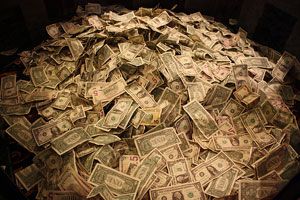
Flickr/<a href="http://www.flickr.com/photos/aresauburnphotos/2678453389/">aresauburn</a> (<a href="http://www.creativecommons.org">Creative Commons</a>).
As we reported earlier, European companies are using political action committees to spend quite a bit on lawmakers who have blocked climate legislation in the Senate. But as Wonk Room reported over the weekend, foreign oil and gas interests have also directed quite a bit of cash to the US Chamber of Commerce, which is running a $75 million campaign focused on ousting congressional Democrats.
Wonk Room notes that a number of foreign oil and gas companies pay their member dues to the Chamber of Commerce’s 501c(6) account, which is the same account that funds its political ads. Those ads have included attacks on Democratic incumbents for supporting the House cap-and-trade bill (a.k.a. the “job-killing energy tax”)—folks like Joe Sestak (D-Penn.), a House member currently running for Senate, and Reps. Alan Grayson (D-Fla.) and Betsy Markey (D-Colo.). Among the groups paying into this electoral war chest, and the interests they represent:
– Avantha Group, India (at least $7,500 in annual member dues): power plants
– The Bahrain Petroleum Company, Kingdom of Bahrain ($5,000): state-owned oil campany
– Gulf Petrochemical Industries Company, Kingdom of Bahrain ($5,000): state-owned oil company
– Essar Group, Mumbai, India ($7,500): oil & gas, coal power
– GMR, Bangalore, India ($15,000): coal power, mining
– Hinduja Group, London, UK ($15,000): the Gulf Oil group
– Jindal Power, New Delhi, India ($15,000): coal power
– Lahmeyer International, Frankfurt, Germany ($7,500): power plant engineering
– Punj Lloyd, Gurgaon, India ($15,000): offshore pipelines
– Reliance Industries, Mumbai, India ($15,000): oil and gas, petrochemicals
– SNC Lavalin, Montreal, Canada ($7,500): mining, power plant, and oil & gas engineering
– Tata Group, Mumbai, India ($15,000): power plants, oil & gas
– Walchandnagar Industries, Mumbai, India ($7,500): power plant, oil & gas engineering
– Welspun, Mumbai, India ($7,500): oil & gas exploration
The Supreme Court’s decision earlier this year in Citizens United has allowed the Chamber and other interest groups to spend unlimited amounts of money on elections without disclosing their donors. Democrats have latched onto the idea that the decision has also allowed groups like the Chamber to funnel foreign money into our elections, unbeknowst to the average citizen. The Chamber says it has accounting methods in place to separate the money and ensure that these funds from other countries aren’t being spent on US elections, and as my colleague Nick Baumann pointed out earlier this month, the amount of domestic money pouring through the Chamber is probably a bigger concern anyway than the relatively small total from foreign corporations. But the money flowing into the Chamber’s coffers from overseas is worth pointing out, as these oil and gas interests clearly have good reason to want to sway debate over climate and energy in the US.












